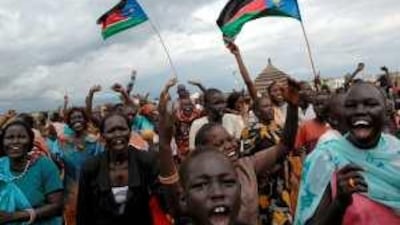NAIROBI // With the potential to pump 400 million barrels of oil in the middle of Sudan, the Abyei region is the literal and symbolic heart of the country. The hotly contested region is squarely at the heart of a conflict between north and south Sudan that has threatened to scuttle a 2005 peace deal. Last week, an international court changed the boundaries of Abyei and ruled that the vital organ is in northern Sudan. Like a patient who has received a heart transplant, all eyes are on Sudan to see if the country accepts or rejects the new organ.
At first, it seemed that the surgery was a success. But recent provocative statements from both sides could put Abyei back on life support. "What we have seen today is a good compromise," Abdelbagi Gailaini, a government minister from the northern ruling party told reporters after The Hague-based Permanent Court of Arbitration decision on Wednesday. "Everybody is committed, and everyone is standing by what this file case has reflected."
Southerners agreed. "We think this decision is going to consolidate the peace," Riek Machar, vice president of the semi-autonomous government of southern Sudan, said in a press conference last week. "We came to see justice and it's a decision we will respect." However, northern and southern leaders this week have traded accusations over the ruling, raising fears of a fresh conflict between the two former enemies.
The Abyei decision is key to consolidating peace before important presidential elections next year and a pair of referendums in 2011. The Christian majority south and Muslim north fought a two-decade civil war in which two million people were killed. A 2005 peace deal ended the war, but left a handful of questions unanswered, among them who gets Abyei and its oil wealth. The oil-rich border territory, home to the African Dinka people and Arab Misseriah, has been a flashpoint, most recently in May last year when fighting between the north and south killed 100 people and razed Abyei town.
In its ruling, the arbitration court moved the boundaries of Abyei leaving the oil fields out of the territory. Extra United Nations peacekeepers patrolled the region before the court's decision, but, instead of violence, both sides celebrated the ruling. About 1,000 southerners in Abyei gathered to watch the court ruling live on TV, according to news agency reports. They cheered and waved southern Sudanese flags after the decision.
Ashraf Qazi, the UN special representative for Sudan, said in a statement that the Abyei dispute is now settled. "This decision clearly demonstrates that, even on the most difficult and sensitive of disputes, the parties can find a peaceful solution if they work together in good faith." Both sides appear to have benefited from the court ruling, which shrunk Abyei by about 8,000 square kilometres. In redrawing the boundaries, the tribunal put the Heglig oil fields squarely in the north. Most of the Dinka land remained within the Abyei territory. The Dinkas are more likely to vote to join the south in the 2011 referendum. This week, Khartoum said it would stop paying the south a portion of Heglig's oil revenue, which it is required to do under the 2005 peace deal, according to the state Sudan Vision newspaper. Taban Deng Gai, a southern state governor, said the north had been premature in claiming the Heglig oilfield after the ruling, because the drill site was still up for grabs under a separate border dispute, Reuters reported. "This decision to stop the payments is wrong," he said, adding that the south might have to go back to The Hague for a decision on Heglig. Analysts warn that other key issues remain on the road to peace between north and south Sudan. A separate conflict in Sudan's western Darfur region has been simmering since 2003. The presidential election in 2010 has been pushed back by a few months because a key census was delayed this year. The first election in more than two decades is an important part of the 2005 peace deal, and its delay could postpone the 2011 referendum. Salva Kiir, the president of southern Sudan, said last month that the south is rearming in preparation for a possible war with the north in 2011, and he accused the north of arming ethnic groups in the south to destabilise the region. This year, a shipment of weapons, including 33 Russian-made tanks arrived at port in Kenya after the boat was hijacked by Somali pirates. Intelligence analysts said the shipment was destined for southern Sudan, although the Kenyans denied this. Analysts have said that some of the weapons passed through Kenya and have already reached southern Sudan. Sudan's president, Omar al Bashir, made a speech soon after The Hague ruling saying all Abyei residents, including Arab nomads associated with the north, would have the right to vote in the referendum. Abyei's southern administrator, Arop Mayok, told Reuters the speech amounted to an invitation for nomads to register as settled Abyei residents to influence the vote. "I hope that there will be a change of heart from those who are releasing such a statement," he said. "It doesn't help in the peace process." Dirdeiry Mohamed Ahmed, the head of the Sudanese government delegation to The Hague, said the south's recent statements on Heglig and the referendum had left him with "misgivings" about the south's motives. "We have heard them make statements that have raised concerns about their commitment to the ruling," he told Reuters. Observers hold out hope that the Abyei decision will be able to diffuse the built-up tension. But for now, Sudan's new heart is faintly beating. mbrown@thenational.ae

